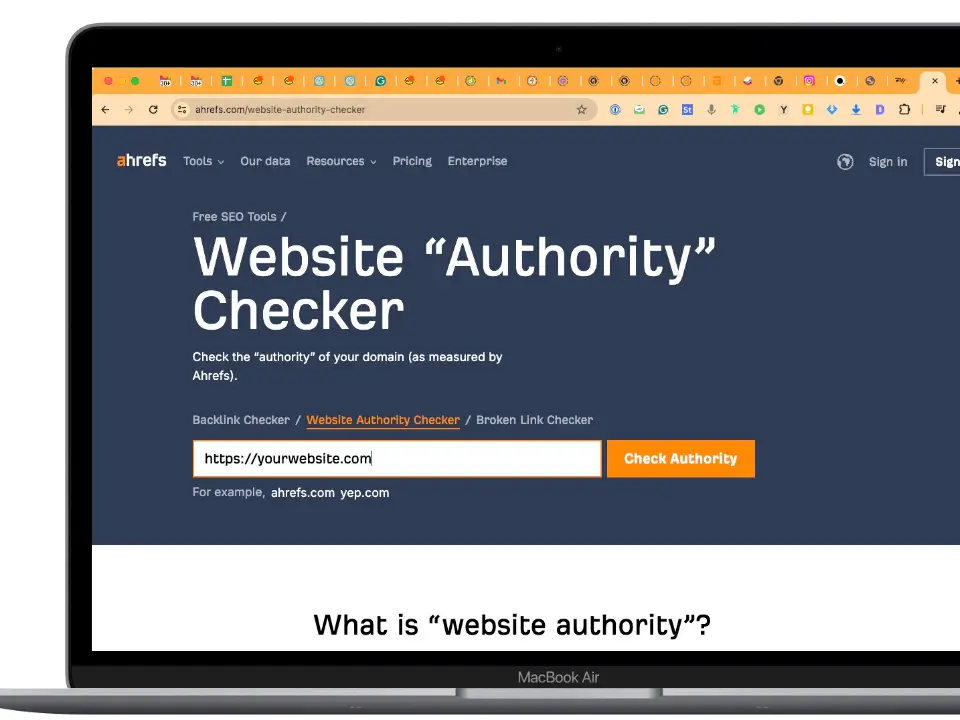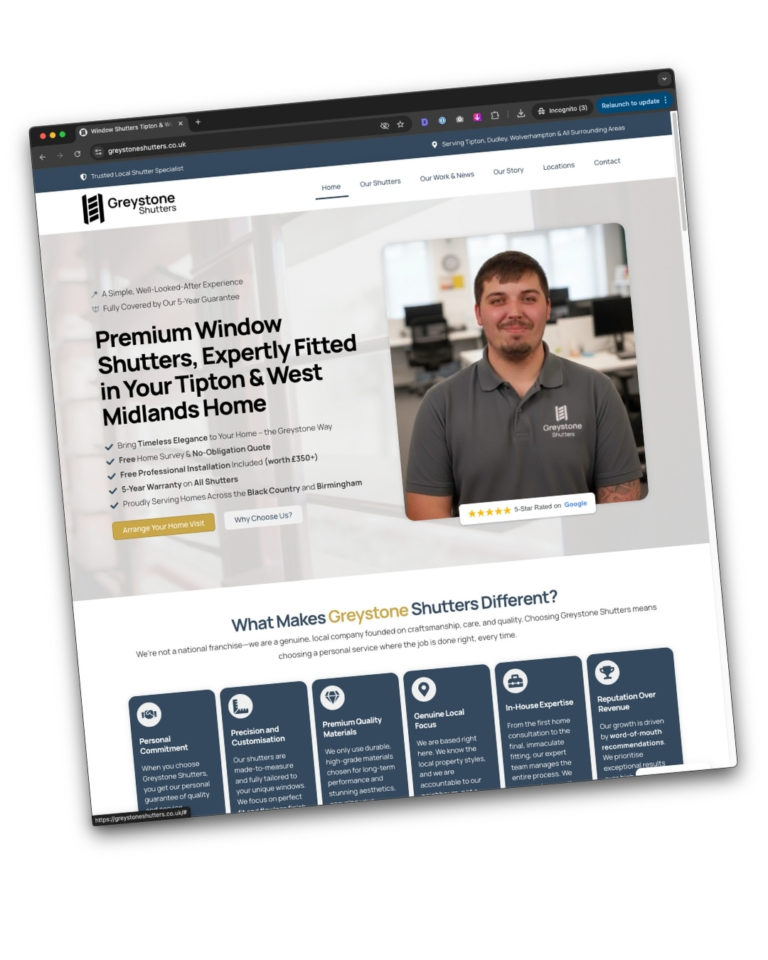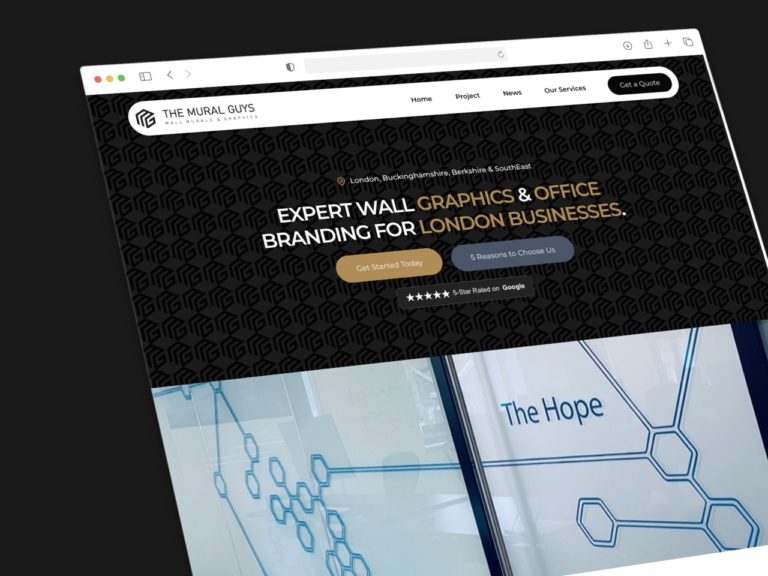What is SEO and Why Does It Matter?
Search engine optimization (SEO) is a technique for updating your website and its content to make it more appealing to search engines like Google. Simply put, Google examines your website to determine whether it is relevant to a user’s search query and ranks it accordingly. For instance, if someone searches for local web design businesses, you would want Google to rank your website in the top 10 results if you are located in that area.
Your website’s content and layout are crucial factors in achieving a higher ranking. Think of SEO as a book, where the title is your homepage, and the subtitles are the different aspects of your page, such as services, work, etc. For instance, the title of our homepage could be ‘Web Design in Loughborough,’ and the subtitles could be ‘Our Web Design Services’ and ‘Our Work.
Off-page SEO is another essential aspect of SEO. It refers to everything not directly on your website, such as backlinks – links from other websites that lead to your website. Google considers the number of backlinks when ranking websites, so having relevant websites linking back to your site is highly beneficial. Another off-page SEO factor is citations, where you ensure that your website appears in relevant directories like Yell.com.
Why does SEO matter? Because a higher ranking means more visitors to your website, which can generate more revenue for your business.
Local SEO and national SEO
There are two different types of SEO: local SEO and national SEO. In terms of the UK, national SEO is going to cover the entire UK and is applicable for businesses that serve more than one location. Then you’ll have local SEO, which is for local businesses such as window cleaners, restaurants, plumbers, or any business that serves local customers.
There are two approaches to consider, and one of the primary ones is an off-page technique called Google Business Profile (GBP). A GBP is a business listing that appears on Google Maps. You’ve likely seen it before—it displays the business name, images, review ratings, services offered, and opening hours. It’s particularly useful when researching businesses before visiting them. For instance, if you search for “Italian restaurant,” you’ll see several business profiles and may choose one based on its reviews.
Our profile at dotwall Web Design provides information about our services, opening hours, contact numbers, and even a meeting link for bookings. With over 80 five-star reviews, it offers valuable insights to potential clients.
These GBP profiles are super powerful when it comes to local business. Imagine if you’re looking for a plumber. For example, you might go to Google and search for Plumber near me, and you might likely make a decision based on how many five-star reviews – this is basic human psychology people are more likely to go with someone being recommended such moments completely unknown.
Website authority, what is it?

Google and other search engines need a way to identify whether every website on the internet can be trusted, they do this via something called Domain authority – DA (or domain rating – DR).
Take a second to how this might look in the real world – do you have someone in your life that you would look to for guidance or advice or even just a recommendation for which restaurant to go to? The reason you trust this person is that you gained credibility for that person through existing in recommendations or guidance. This is the same for websites you’re only going to want to see recommendations or guidance from websites that have a high authority – if the website is brand new and has absolutely no authority then more than likely it will not be ranked by Google over another website with the same content that has a higher domain authority this is simply because Google trusts the higher authority website over the lower one.
Now imagine two websites are identical in size and page numbers, etc – they’re both in the industry of decorating, and they both put out a blog post about the top 10 recommended paintbrushes – both blog posts are identical in terms of their text and images and titles – however, One website has an authority score of zero and the other has authority score of 45/100. Google will rank the higher authority website over the other websites with zero – this is how Google identifies which websites can have their content published and beat the competition.
When determining a website’s authority, the number of reputable websites linking to it is key. For example, if a website has many credible sources, like BBC.co.uk, linking to it, it will have a high authority score. It has a good track record of providing reliable and intelligent information for many years. However, for a brand-new website, no matter how big or how many pages it has, it will have an authority score of zero; this is because search engines like Google are unfamiliar with it, and it has yet to have time to build up credibility or authority.


What’s the fastest way to build website authority?
That’s a great question! The answer involves a combination of content and link building. To improve your website’s search engine ranking, it’s essential to have accurate and relevant information. These days, it’s also crucial to provide helpful information, such as through blog posts. For instance, if you run a window cleaning company, writing an article about the different types of window cleaners available would be very helpful to your website visitors. This provides value to your audience and improves your chances of appearing in search results. By offering information about various window cleaning techniques, you can help educate the public and establish your authority in the industry.
Link building is an essential aspect of website optimisation. It would be best if you focused on acquiring relevant links back to your website in addition to the usual links such as yell.com, etc. One way to get links is by brainstorming ideas of stakeholders or suppliers in your industry and asking them for a link. These links are valuable because they are relevant to your business. Another way to get links is by offering a guest post on your industry’s blog. For example, if there is a window cleaning blog, you might offer to write a comprehensive post about different types of window cleaning in exchange for a link back to your website. This is a genuine way of obtaining a link because you are offering value in exchange for a link
Another method of link building includes purchasing links, but you want to make sure these purchase links are good and relevant and that they are not just family links from websites that have nothing to do with your website.
But be warned: Google not only ranks good links, it also ranks bad links. There are services out there that sell links to websites for little money and can generate hundreds of links. But Google is aware of these businesses and deems these to be bad/spam links. After all, Google doesn’t want people and businesses to game the system.
If you are unsure or curious, try entering the website’s address (URL) into a site like SpamAdvisor. This website will give you an overview of whether the website is spammy or not.
Three things you can do today to improve your website SEO without the need for an SEO expert
First up: Start a blog
If your website has a blog, then start writing, even if it’s one post per week or one post per month. Something is better than nothing, and just imagine over a year how much content you will have on your blog, and this is all rich, good content for Google to start ranking your website for. Let’s go back to that example of the window cleaning business – here are 10 different ideas for blog posts:
- Unleash the Beauty of Your Home with Professional Window Cleaning.
- Why Regular Window Cleaning Matters for Your Home’s Health: Beyond the Streak.
- Spring Cleaning Hacks for Sparkling Windows: Shine On!
- How Professional Window Cleaning Can Boost Your Mood: Let the Light In.
- Clean Windows Enhance Your Home’s Value: Curb Appeal Champions.
- Eco-Friendly Window Cleaning Solutions: Bye-Bye Bird Droppings!
- Maintaining Privacy with Professional Window Cleaning: Don’t Be a Peeping Tom!
- The Ultimate Guide to Sparkling Windows: From Grime to Glam.
- Enjoy Crystal Clear Views All Year Round with Window Cleaning Services: Rainy Day Blues?
- How Professional Window Cleaning Can Prevent Accidents: Safety First.
What blog titles can you come up with for your business blog?
Second: Start reaching out for backlinks
Start reaching out for backlinks today! Backlinks are massively important with regards to your website’s SEO, and as soon as you start reaching out to the backlinks, the sooner you can start getting links that will start ageing – ageing makes what’s that? – one of the most significant ranking factors for the deal to determine how credible you are is how old your backlinks are for example, if you’ve got a link back to your website from another website that is ten years old, this will be seen as highly credible because the link is the test of time so long so if you see start getting links as soon as they can start ageing. Here is a list of places you can think about to get links for your website:
- Industry directories: Submit your business to relevant industry-specific directories. These often provide high-quality backlinks.
- Guest blogging: Contribute articles to reputable blogs in your niche. In exchange, you can include backlinks in your author bio or within the content.
- Local business networks: Engage with local business associations or chambers of commerce that offer member listings.
- Business partners: Collaborate with partners or complementary businesses that might link to your site through partnerships, case studies, or testimonials.
- Trade publications: Contact trade magazines and websites for interviews or bylined articles.
- Educational institutions: Educational Institutions
- Influencers and content creators: Partner with relevant influencers who can provide backlinks via sponsored content or recommendations.
- Resource pages: Find websites with curated resource pages in your field and offer your content as a valuable addition.
Third: Ask for more reviews for your Google Business Profile (or Trustpilot)
Gathering more reviews is crucial for your business, as people are more likely to choose your products or services if others have enjoyed them and left positive feedback. For local businesses, focusing on Google Business Profile is highly effective. People often search for services near them, like “electrician near me,” and you want your business to top that list. Suppose potential customers see three electricians: one with over 100 five-star reviews, another with 11 reviews averaging 3.8 stars, and a third with no reviews. In that case, the 100 five-star review business will likely be contacted first.
If your business operates nationally, consider a platform like Trustpilot. They’re excellent at collecting reviews, especially for multinational companies. When visitors search for your business, they’ll find your website and your Trustpilot page, showcasing your reviews and star rating, boosting credibility directly from Google search results.
With the rise of AI will SEO still be relevant?
Yes, SEO will always be relevant in some form, especially in link building. Yes, AI might take more of a prominent role, so if you Google something, Google might potentially generate answers, but all these answers will need to be sourced by real websites. The main thing in SEO is ensuring that a website has authority and incredible quality, and for this, SEO will always be relevant as these two factors always fall under the SEO umbrella.

Some great free SEO resources:
DA Checker: this website will check the domain authority of any website, remember the score is out of 100 and the higher the score the better the website is.
https://ahrefs.com/website-authority-checker
Backlink checker: this website will provide you with all the backlinks you currently have on your website (or you can check your competitors website):
https://ahrefs.com/backlink-checker
Statistics finder: This is a great resource if you’re writing a blog post and want some real stats to back up your post.
https://fatjoe.com/tools/statistics-finder
Free SEO audit:
Want a completely free SEO audit? Fill in the form below to request one, or book a meeting with us here for a no-obligation chat about websites, SEO, branding — anything really 😊





